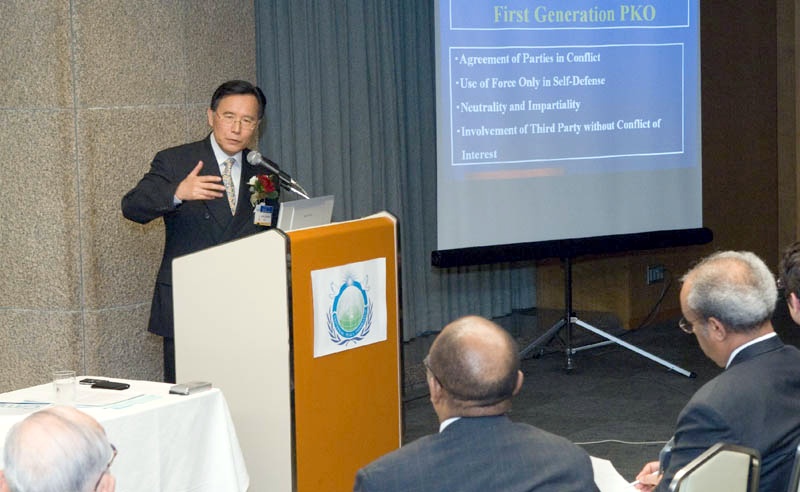
The Words of the Yamazaki Family
|
|
The Words of the Yamazaki Family |
Japan: UN reform a must, says former U.N. official
Hiroshi Yamazaki
November 30, 2007
UPI Correspondent
Tokyo, Japan

"We need to reform the Security Council of the United Nations to reflect the reality of the world today," said Dr. Sukehiro Hasegawa, former Special Representative of the U.N. Secretary General in Timor-Leste at a forum this week among diplomats, politicians and peace activists in Tokyo.
The forum was organized by the Japanese chapter of the Universal Peace Federation, a New York-based non-governmental organization that encourages dialogue and reconciliation among conflicting parties in various parts of the world. One item on the group's agenda is U.N. reform, particularly in rallying support for more active involvement of religious or moral leadership in solving international disputes, including the Middle East crisis.
Hasegawa served in the U.N. system for 37 years, including engagements in the violent and confusing fields of Somalia, Rwanda and Timor-Leste. Thus, he is one of few Japanese well qualified to talk about the merits and weaknesses of the international body from his own personal experience.
On a number of occasions he found himself in the middle of a conflict, with tragedy unfolding in front of his own eyes. Among the events that still torment him were the killings in Rwanda in 1995, in which the United Nations estimates more than 2,000 civilians lost their lives, including many women and children. A Rwandan diplomat at the forum called it "a complete failure of the U.N. operation."
Hasegawa recalled the reality in the field, explaining that the Security Council is very much in charge of field operations in times of crisis. "You just cannot get necessary authorization from the Security Council in a timely manner" to deal with changing situations, he said.
This is because, as he put it, "The Security Council reflects the views of very divergent groups of this planet." Thus, in order to make U.N. peace operations more effective, he urged the dozens of diplomats present at the forum, including several ambassadors to Japan, to press ahead with reform of the United Nations in general and the Security Council in particular.
The United Nations is now engaged in 17 peacekeeping operations around the world, mostly in Africa and the Middle East, including the recently sanctioned mission in Darful, Sudan. Some 67,000 personnel from 103 countries are mobilized under the U.N. mandate.
According to Hasegawa, who now teaches at a couple of colleges including the U.N. University based in Tokyo, the United Nations' role in the peacemaking process has evolved significantly, especially since the end of the Cold War.
From a mere disengagement force as in the Korean peninsula, U.N. peacekeepers are now called upon to perform military, humanitarian, emergency and nation-building activities, sometimes virtually taking over the sovereign rights of the countries in which they operate.
Reflecting upon the bitter experience of clashes and turmoil last year in Timor-Leste after the Security Council decided to reduce the peacekeeping force stationed there, Hasegawa cautioned against the "premature withdrawal of security forces" from areas emerging from conflicts. In fact, he explained, "Police force training is now one of the main keys of U.N. peace-building activities."
Since Japan was admitted to the United Nations in 1956, its diplomacy has been faithfully U.N.-centered and it has been the second largest contributor of funds to the international body. Despite this, the Japanese government has failed to muster international support for its initiatives on U.N. reform, including its own permanent seat on the Security Council.